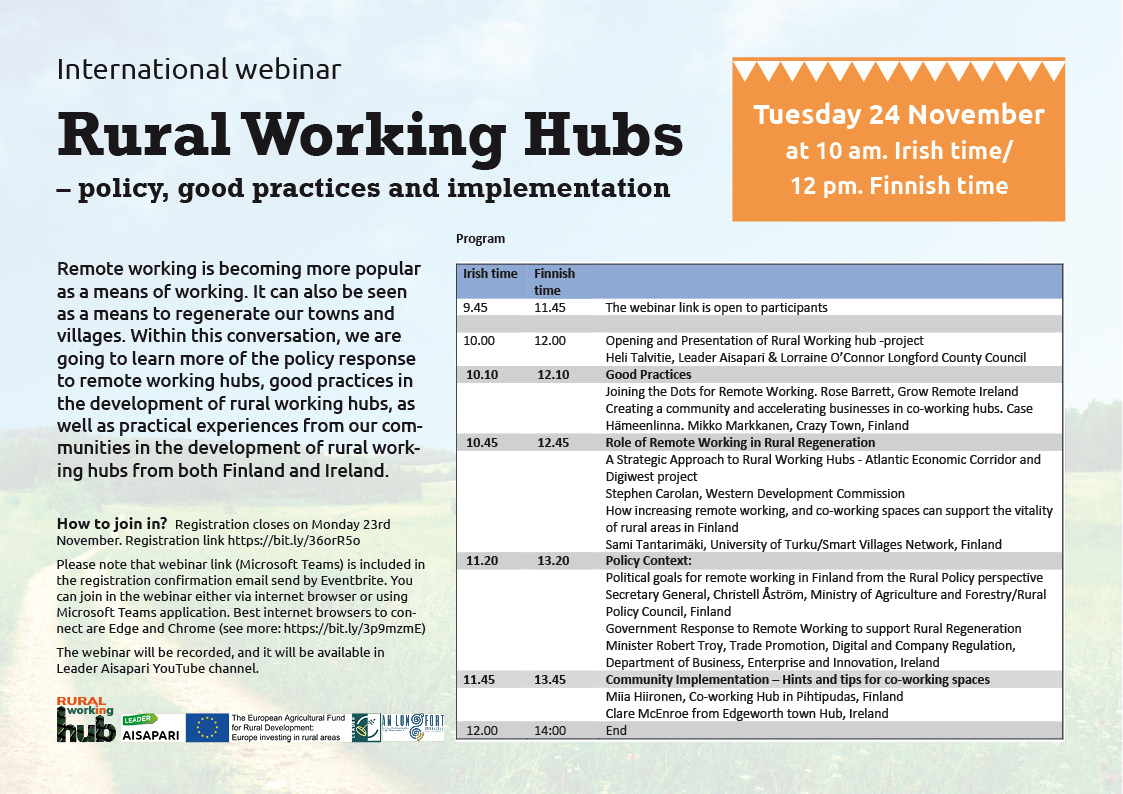Rural Working Hubs V1
Rural Working Hubs Webinar on 3 March 2021
Longford County Council, as part of their participation in the Rural Working Hubs project, hosted an online information webinar on Wednesday 3rd March 2021 to provide groups and individuals interested in establishing rural working hubs an insight into the various types of hubs as well as practical information on their operation. We were delighted to welcome Stephen Carolan of the Western Development Commission who are leading the way in supporting the development of hubs in rural Ireland and Leah Fairman, manager of The Base Enterprise Centre in Stranorlar, Co. Donegal. The webinar provided groups with some valuable insight into what it takes to run a successful hub and the importance of the building of a strong community. The various types of hubs were outlined so groups can identify where they fit within the hub network and the different services that are required. We hope that the information session provided groups interested in the establishment of a hub in their community valuable information that will result in the development of a strong hub network across County Longford. The webinar can be viewed on the link below.
https://youtu.be/Ib29oRQFqcI
Successful Rural Working Hubs Webinar
On 24 November 2020 Longford County Council Regeneration Department were delighted to welcome over 90 people to an online webinar for a discussion on Rural Working Hubs. The webinar generated a very interesting discussion looking at policy, good practices and implementation in both Ireland and Finland in the development of rural working hubs. Speakers at the event included Minister of State Robert Troy who presented the Government's response to remote working and outlined their support and commitment to further develop remote working opportunities. Tracy Keogh, co-founder of Grow Remote highlighted the work of the company in promoting remote working and assisting our communities to become remote ready. Stephen Carolan and Deirdre Frost from the Western Development Commission spoke about the progress in the Atlantic Economic Corridor project and the recently published data that will help to inform the future development of remote working hubs. Clare McEnroe identified some of the key learnings from the community point of view in terms of her involvement in the development of co:worx digital hub in Edgeworthstown. This webinar and the continued work of the Regeneration Department under the Rural Working Hubs project will help inform the future development of hubs across County Longford. The webinar as well as the presentations on the day can be viewed on the links below.
https://youtu.be/NXYhhIAnUWo
Wanna-Hub_Miia_Hiironen.pptx (size 2.5 MB)
RWH-webinar_2020-11-24.pdf (size 568.5 KB)
Rural-working-Hubs---Clare-McEnroe.pptx (size 8.1 MB)
Rural-hubs-Crazy-Town-24.11.2020_.pdf (size 12.6 MB)
Grow-Remote---Coworking-Public-Deck.pptx (size 15.5 MB)
CA_Political-goals-for-Remote-working-in-Finnish-Rural-Policy.pdf (size 1.5 MB)
AEC-Hub-Master---Longford-County-Concil.pptx (size 3.2 MB)
2020-11-24_RWH-webinar_menti_results.pdf (size 828.9 KB)
Rural-Working-Hub-24112020_Tantarimaki
Invitation to Rural Working Hubs Webinar on Tuesday 24th November 2020
Longford County Council Regeneration Department, with our project partners in Leader Aisapari in Finland, invite you to join us in a conversation on rural working hubs. The discussion will include speakers from Finland and Ireland and will provide participants with an insight into the policy context, strategic approach and good practices in the development of rural working hubs, as well as practical experience from a community perspective.

Rural Working Hubs
Due to Longford’s location with good accessibility to Dublin and larger urban centres, large numbers of people commute out of Longford daily for work. According to the Census 2016, 3,324 workers travelled outside the county for work, with 846 of those having a work travel time of >90 minutes.
Covid-19 has taught us that there is now an opportunity to rethink how we work and interact with each other, as well as the space around us. It has opened up the possibility of remote working to a much wider cohort and made us all see the benefits of removing long daily commutes from our lives. This positively impacts on our work life balance, as well as our local communities and will also positively contribute to the economic regeneration of our county.
Longford County Council Regeneration Department has been working with local communities across the county to develop a network of rural working hubs. When completed, these hubs will provide commuters and start-ups/entrepreneurs with the opportunity to relocate to a workspace close to where they live. The hubs will provide an opportunity for networking and the creation of new opportunities for businesses to develop in our local communities, playing an important role in our economic recovery from Covid-19 and making our communities more sustainable.
In order to help us ensure best practice and learning from other areas, Longford County Council Regeneration Team are also working with partners in Finland in the study of the area of rural working hubs. We hope the sharing of best practice, both nationally and internationally, will help us to develop a network of hubs across the county that will allow people to have a healthier work life balance and to play a greater part in their local community.
The Regeneration Department are working on a co-operation project funded by LEADER on Rural Working Hubs with LEADER Aisapari, which is a local development organisation for six rural communities in western Finland. Our involvement in this project aims to allow us to take a strategic approach to the provision of remote working facilities within our county. We are currently working closely with the local communities in Edgeworthstown and Abbeyshrule in the delivery of remote working hubs in those towns and identification of further suitable locations for such facilities. We are also engaged with the Midlands Network of Co-Working Facilities, which comprises over 20 facilities in the Midlands region, with the aim of providing 600 desk spaces giving an opportunity to the 24,000 workers currently commuting out of the region to work locally and create an opportunity for second landing spaces to be developed for large companies in the region. We are also part of the Grow Remote Longford Chapter, bringing remote working to our communities.